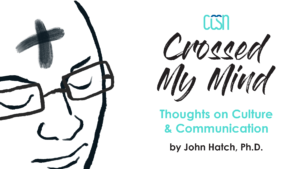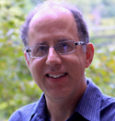 Column title: Crossed My Mind: Thoughts on Culture and Communication
Column title: Crossed My Mind: Thoughts on Culture and Communication
Column entry: “Untangling CRT for Christians (Part 4 of 4)”
By John Hatch, Ph.D.
Eastern University (retired)
CCSN Senior Fellow
Column Description: As Christians, we are called to have the mind of Christ. This goes against the grain of our social and cultural conditioning. We seek personal or political advancement; Christ seeks the lost and the least. We grasp for cultural ascendency; Christ descends to the cross of love. This column is dedicated to thinking about culture and communication under the sign of the cross.
June 2025 / April 2025 / March 2025 / February 2025 / September 2024 / August 2024 / June-July 2024 / May 2024 / April 2024 / March 2024 | February 2024(2) / February 2024(1) / January 2024 / December 2023 / November 2023 / October 2023 / July 2023 / June 2023 / May 2023 / April 2023 / March 2023 / February 2023 / January 2023 / December 2022 / November(2) 2022 / November 2022 / October 2022 / August-September 2022 / June-July 2022 / January 2022 / December 2021 / October-November 2021
Untangling CRT, Redeeming Social Justice, Healing from Injustice (Part 4 of 4)
The first three parts of this series introduced Ed Uszynski’s Untangling Critical Race Theory (InterVarsity Press, 2024) as a primer, balanced appraisal, and wise guide for Christians responding to CRT.[1] Parts 1 and 2 discussed Uszynski’s background, CRT’s roots in Critical Theory, and CRT’s actual tenets, in contrast with popular misunderstandings/misrepresentations. Part 3 discussed some of Uszynski’s responses to nearly a dozen concerns that many Christians express about Critical Race Theory.
This final installment will take a look at the last three chapters, in which Uszynski widens the frame from CRT to biblical justice and the Church’s racial responsibility.
If, as Untangling has argued up to this point, the fundamental problem regarding race in America is not Critical Race Theory, but rather the western/white church’s blinders toward racism across centuries till now, what are Christians to do? Uszynski distills the tasks at hand into two main goals: “Redeeming ‘Social Justice’ from Injustice” (chapter 13) and “Healing from the Persistence of White Supremacy” (chapter 14). The first goal requires a deeper understanding of biblical justice, the second a better grasp of modern Western history.
Chapter 13 begins with an arresting quote: “‘Justice was discipled out of me.’”[2] This statement encapsulates how evangelical leaders and ministries not only overlook the abundance of scripture on social justice, they also disparage and demonize it as an anti-biblical, Marxist idea—a charge that doesn’t square with history.
In fact, the term social justice was introduced by a Catholic priest/scholar in the 19th century, rooted in Scripture and ancient Church tradition. After acknowledging this history, Uszynski unpacks two frequently recurring words for justice in the Hebrew Bible. Both mishpat and tsedaqah focus on fair and equitable treatment of fellow human beings, rather than mere punishment for crimes. That’s why these words repeatedly appear in conjunction with references to “widows, orphans, immigrants, and the poor,” groups that “lack social power, leaving them most vulnerable to being mistreated.”[3] To the extent that mishpat confronts criminal offenses, it is especially concerned with equitable treatment of these groups—e.g., no double standards for rich vs. poor or Jewish natives vs. immigrants/refugees in Israel. Meanwhile, tsedaqah—meaning “just” or “righteous”—denotes a pattern of treating others fairly, generously, and equitably in one’s daily life.[4] Uszynski sums up the spiritual implications of biblical social justice: “Real justice protects the imago Dei, promotes human flourishing, and reflects God’s shalom. On the other hand, social injustice is like oxygen for the principalities and powers of this present darkness.”[5]
When Christians understand and promote biblical social justice, they can redeem modern-day distortions of the concept; but when they reject it, they end up fueling those distortions. For example, Critical Social Justice tries to fill a vacuum left by our failures to protect human rights, speak up for marginalized voices, and ensure that all people’s basic needs are met. Yet because CSJ lacks any connection with the Creator, its proponents “put the power of offended groups at the center of social justice,” such that “one group of fallen people using power to their advantage gets replaced by another group doing the same.”[6] Although structural inequalities are addressed, sin in the human heart is not.
We find similar shortcomings in the social gospel and liberation theology. The former focuses on social reform while “water[ing] down the bad news of people’s spiritual condition and the solution offered by the cross;” and the latter sacrifices “calls to repentance . . . on the altar of freedom from oppression.”[7] Yet both these approaches arose in response to a more fundamental problem: “Christians not taking biblical social justice seriously enough in their sphere of influence . . . orthodox teaching lacking the teeth of real-world aid on behalf of oppressed people.”[8]
Thus, Christ-followers need to recapture the full picture of God’s justice, in thinking and practice. To help us do this vis-à-vis race, Uszynski makes several practical suggestions. These include asking why people are attracted to distortions of true justice, and letting Scripture, not political parties or ideologies, set our terms of engagement with the topic.
Whereas chapter 13 aims to reset Christians’ thinking about social justice, chapter 14 focuses on exposing the insidious ideology of whiteness—not the mere fact of white skin, but the sinful assumptions and values surrounding it. As Uszynski puts it, “The only way to really understand how race works in this country is to pay more attention to the color all other colors are compared to [i.e., white skin] and the ideology behind it.”[9] Here, “compared” and “ideology” are the key concepts: “Europeans came to this land with a superiority complex, baked it into every level of society, and used it to dominate everyone in their way.”[10] Desiring to possess the lands or bodies of Black, Indigenous, and People of Color (BIPOC) for economic gain, people of European descent dehumanized them and rationalized their oppression: “Using religion, they made them expendable for not knowing Jesus. Then, even after many of them came to Jesus, politics made them expendable because they might rebel. Finally, science made them expendable by developing the ‘truth’ that dark-skinned people are biologically and mentally inferior to white-skinned people.”[11] While this ideology of white supremacy did not always take the form of racial hatred, it necessarily fostered a sense of whiteness as the norm, structured society as a racial hierarchy, and fueled the concentration of political, economic, and cultural power in the hands of white people at the expense of BIPOC.
Until we face this historical reality and its effects on the present, white people in the church will still tend to view themselves (often subconsciously) as the cultural norm and will disproportionately control power and material resources in their congregations, denominations, and ministry organizations. Yet all too often, we avoid facing it. As Uszynski observes, “many people who say it’s time to stop talking about race never really started talking about it in the first place, or at least not in a productive way with people different from them.”[12] If we are to love our BIPOC brothers and sisters, white Christians must be willing to repent of the deep-rooted ideology/idolatry of whiteness in their congregations and ministries.
Chapter 15 concludes the book with a positive vision of how the church, at its best, approaches its racial challenges. Uszynski lifts up the example of evangelical leaders who hold a high view of biblical truth, avoid false binaries, and make justice a core element of their discipleship. These leaders focus neither on attacking the bogeyman of CRT nor “trying to figure out who the racists are in the room,” but rather on “addressing cultural patterns and ways of operating that work against being the people of God” and “practicing how to be in relationship with people different from themselves.”[13]
Uszynski’s focus on hope and positive change in the church—together with his irenic stance, honesty about his own fears and prejudices, and identification with his target audience—make Untangling Critical Race Theory a vital book for the church. It would also make a good text for Christian college classes in race, diversity, and perhaps intercultural communication. If only Uszynski had published it five years sooner! Perhaps the unfair caricatures and divisive rhetoric of anti-CRT authors would not have gained such traction in the church. One can only hope that this book will repair some of the damage that has been done and set many Christians on a more productive path toward racial healing.
Notes
[1] Ed Uszynski, Untangling Critical Race Theory: What Christians Need to Know and Why It Matters (Downers Grove, IL: 2024).
[2] Uszynski, Untangling Critical Race Theory, 205.
[3] Uszynski, Untangling Critical Race Theory, 207.
[4] Uszynski, Untangling Critical Race Theory, 206-08.
[5] Uszynski, Untangling Critical Race Theory, 215.
[6] Uszynski, Untangling Critical Race Theory, 211, 210.
[7] Uszynski, Untangling Critical Race Theory, 208.
[8] Uszynski, Untangling Critical Race Theory, 208-09.
[9] Uszynski, Untangling Critical Race Theory, 219.
[10] Uszynski, Untangling Critical Race Theory, 223.
[11] Uszynski, Untangling Critical Race Theory, 222.
[12] Uszynski, Untangling Critical Race Theory, 228.
[13] Uszynski, Untangling Critical Race Theory, 236-37.
* The views of any CCSN columnists are their own, and do not necessarily represent the views of the CCSN. We invite and embrace a wide range of views and critiques on important communication and cultural issues from a Christian perspective. The CCSN is a community of Jesus followers who study communication. We do not support or promote a particular social, political, or denominational agenda.
Notes
[i] Ed Uszynski, Untangling Critical Race Theory: What Christians Need to Know and Why It Matters (Downers Grove, IL: 2024).
[ii] Uszynski, Untangling Critical Race Theory, 205.
[iii] Uszynski, Untangling Critical Race Theory, 207.
[iv] Uszynski, Untangling Critical Race Theory, 206-08.
[v] Uszynski, Untangling Critical Race Theory, 215.
[vi] Uszynski, Untangling Critical Race Theory, 211, 210.
[vii] Uszynski, Untangling Critical Race Theory, 208.
[viii] Uszynski, Untangling Critical Race Theory, 208-09.
[ix] Uszynski, Untangling Critical Race Theory, 219.
[x] Uszynski, Untangling Critical Race Theory, 223.
[xi] Uszynski, Untangling Critical Race Theory, 222.
[xii] Uszynski, Untangling Critical Race Theory, 228.
[xiii] Uszynski, Untangling Critical Race Theory, 236-37.

